Edie Melson's Blog, page 78
August 30, 2023
Are You Using the Right Light When You Write?
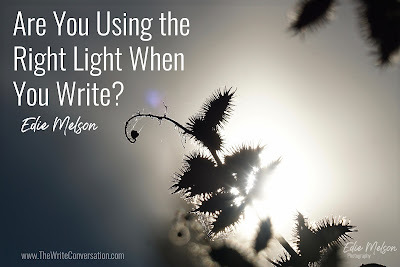
by Edie Melson @EdieMelson
For you were once darkness, but now you are light in the Lord. Walk as children of light Ephesians 5:8 (HCSB)
In addition to being a writer, I’m also a photographer. And one of the earliest lessons I learned about good photography was that exposure matters. I’ll be non-technical: for an image to work, there has to be light—and plenty of it—or the picture won’t look right. Not enough light means it’s a blurry dark mess that’s unrecognizable. No matter how much post editing we do to an underexposed picture, it can’t be fixed. Contrary to that, too much light will blow out a picture—littering an otherwise beautiful image with spots of bright white that can’t be toned down. I’ve discovered that developing a life of writing is a lot like finding the perfect exposure for a picture.
I can’t do it in the dark. The dark is a scary place, and when I’m there, my fears take root and grow.
As a writer, trying to write in the dark means trying to compose my thoughts away from God. He’s the light-bearer for my life. His insight and illumination brightens all that I write. When I don’t spend time with Him—in prayer, Bible reading, and reflection—my words lose their shine.
The over-exposure that sometimes happens isn’t too much God in my life. There can never be enough of God—ever. But that destructive light comes when I’m spending too much time in the false light of the world. I’m exposing myself to the lies that tell me I’ll never be good enough, or keep up with the trends, or reach the people I want to reach. By bathing myself in the light of those lies, I destroy the composition I’m working toward with my words.
Now I’m working to compose my writing life with an eye toward the amount, and type, of light around me. Join me and let God use our words to bring light to a world that is dark.
TWEETABLEAre You Using the Right Light When You Write? @EdieMelson (Click to Tweet)
*Excerpt from Soul Care for Writers , by Edie Melson, Published by Bold Vision Books 2019
 Edie Melson is a woman of faith with ink-stained fingers observing life through the lens of her camera. No matter whether she’s talking to writers, entrepreneurs, or readers, her first advice is always “Find your voice, live your story.” As an author, blogger, and speaker she’s encouraged and challenged audiences across the country and around the world. Her numerous books reflect her passion to help others develop the strength of their God-given gifts and apply them to their lives.Connect with her on her website, through Facebook, Twitter and on Instagram.
Edie Melson is a woman of faith with ink-stained fingers observing life through the lens of her camera. No matter whether she’s talking to writers, entrepreneurs, or readers, her first advice is always “Find your voice, live your story.” As an author, blogger, and speaker she’s encouraged and challenged audiences across the country and around the world. Her numerous books reflect her passion to help others develop the strength of their God-given gifts and apply them to their lives.Connect with her on her website, through Facebook, Twitter and on Instagram.
August 29, 2023
9 things on My NOT-TO-DO Writing List
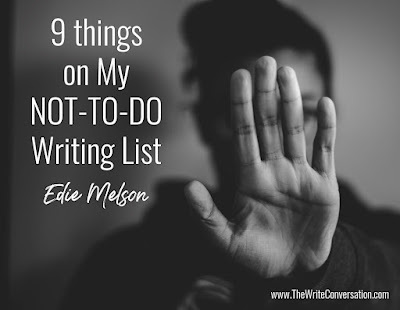
by Edie Melson @EdieMelson
I don’t know about you, but life can be a little stressful when my To Do list is full to overflowing. To combat this, I spend some time taking an honest look at all the things on my plate. When I've done this, I inevitably find that just like piling on too much at a family potluck, my plate is overloaded.
It’s funny, but the worst offenders always turn out to be the things I really shouldn’t have added in the first place. So today I’m sharing what I discovered. And by the way, discovering these was painful for me too!
A NOT-TO-DO List for Writers
1. Stop worrying about results. I’m a control freak and spend the most mental effort trying to affect outcomes instead of pouring energy into the work itself. I will be obedient with what God has given me (time, ideas, resources, etc.) and I will leave the results up to Him
The heart of man plans his way, but the LORD establishes his steps. (Proverbs 16:9 ESV)
2. Quit comparing. So what if Susi Author has 25,000 Instagram followers or Jason Writer finaled in the most recent contest? God has a plan for MY writing that doesn’t look like anyone else’s. I need to focus on that, not what is happening to everyone.
For where envy and selfish ambition exist, there is disorder and every kind of evil. (James 3:16 HCSB)
3. Stop shortchanging time with God. I’ve learned that when I’m over loaded the LAST thing I need to do is skimp on reading the Bible, praying and spending time with God.
But seek first the kingdom of God and his righteousness, and all these things will be added to you. (Matthew 6:33 ESV)
4. Don’t work even harder. But stressed makes me want to work longer hours to get caught up. That’s a trap. Instead, when life caves in, rest and joyful activities are even more important. We can’t get water from a dry well.
And he said to them, “Come away by yourselves to a desolate place and rest a while.” For many were coming and going, and they had no leisure even to eat. (Mark 6:31 ESV)
5. Stop relying on your own strength. This goes hand in hand with #4 above. All my inspiration, talent and knowledge comes from God. It’s HIS strength that gets me through the hard times.
Do not fear, for I am with you; Do not be afraid, for I am your God. I will strengthen you, I will also help you, I will also uphold you with My righteous right hand.’ (Isaiah 41:10 NASB)
6. Don’t give head-space to doubt and fear. I have learned that when I’m stressed, Satan comes after me swinging hard. And one of the first traps he sets is with doubt and fear. When life is difficult is NOT the time to rethink your calling or stop because you’re afraid. Instead it’s time to remember God’s call and move forward in faith.
For the gifts and the call of God are irrevocable.(Romans 11:29 NET)
7. Stop working in chaos. When I get overwhelmed, I get mentally messy and scattered. I’ve found that’s when I need to stop, make a list and prioritize. I look at my schedule and figure out what I actually time I actually have and how I can use it most effeciently.
For God is not a God of disorder but of peace—as in all the congregations of the Lord’s people.(1 Corinthians 14:33 NIV)
8. Don’t anticipate trouble. When I’m stressed, I often slip into a negative mindset and find myself assuming the next email/phone call/message will be more problems. When I quit looking for trouble, it’s easier to dig my way out of an overloaded season.
So then, do not worry about tomorrow, for tomorrow will worry about itself. Today has enough trouble of its own. (Matthew 6:34 ESV)
9. Quit assuming it’s always going to be this way. When I’m in a hard season, I tend to feel like things are never going to get better. I need to remember life hasn’t always been this way and there will come a time when it will get easier.
Because of the Lord’s faithful love we do not perish, for His mercies never end. They are new every morning; great is Your faithfulness (Lamentations 3:22-23 HCSB)
The life of a writer has seasons—some are easy and some are more difficult. The one constant in our lives is God. Where ever we are, He is with us. The most important thing to remember is not to get caught up looking at the problems and instead look up. Whatever we’re facing, He’s already got a plan.
This is my NOT To Do List, what would you add to it?
Don’t forget to join the conversation!
Blessings,Edie
TWEETABLE9 things on My NOT-TO-DO Writing List from @EdieMelson (Click to Tweet)
 Edie Melson is a woman of faith with ink-stained fingers observing life through the lens of her camera. No matter whether she’s talking to writers, entrepreneurs, or readers, her first advice is always “Find your voice, live your story.” As an author, blogger, and speaker she’s encouraged and challenged audiences across the country and around the world. Her numerous books reflect her passion to help others develop the strength of their God-given gifts and apply them to their lives.Connect with her on her website, through Facebook, Twitter and on Instagram.
Edie Melson is a woman of faith with ink-stained fingers observing life through the lens of her camera. No matter whether she’s talking to writers, entrepreneurs, or readers, her first advice is always “Find your voice, live your story.” As an author, blogger, and speaker she’s encouraged and challenged audiences across the country and around the world. Her numerous books reflect her passion to help others develop the strength of their God-given gifts and apply them to their lives.Connect with her on her website, through Facebook, Twitter and on Instagram.Featured Image: Photo by Nadine Shaabana on Unsplash
August 28, 2023
19 Writing Truths to Smooth Your Path, Renew Your Joy and Instill Peace for the Journey

by Edie Melson @EdieMelson
Writing is something that begins in our souls. We love stories, books, words and even grammar. These are more than the tools of our trade, they are the playthings of our lives. Today I invite you to play, enjoying these 19 truths about writing. 1. “Writing isn’t just putting words on paper; it's revealing pieces of your soul to the world." 2. "In the quiet moments, a writer's imagination dances with infinite possibilities." 3. "Embrace the messiness of your first draft, for within it lies the raw beauty of creativity." 4. "Writing isn't about having all the answers; it's about exploring the questions that stir your heart." 5. "We can find solace in the written word, because it has the power to heal both the writer and the reader."6. "A writer's journey is not a solitary one; we're accompanied by the characters who whisper their stories into our souls." 7. "Fear and doubt are the dragons every writer must slay to reach the treasure of their own creativity." 8. "Writing is a mosaic of moments woven together with threads of imagination and ink." 9. "Don't wait for inspiration to strike. Search for it in the ordinary and do the work of transforming it into the extraordinary."10. "A writer's heart is a wellspring of emotions. Use it to breathe life into your words." 11. "Rejection is not the end but a stepping stone on the path to becoming a resilient writer." 12. "Writing is the closest we can come to capturing the intangible essence of our thoughts and dreams."13. "Celebrate the small victories on your writing journey, for they are the paving stones on the way to greater achievements.14. "The blank page is a canvas of endless opportunities, don't be afraid of it it." "Writing requires both discipline and grace, the balance between the two shapes a writer's soul."15. "A writer's voice is a blend of authenticity and vulnerability that resonates across time with our readers." 16. "Just as a potter shapes clay, a writer molds words into worlds that breathe and live." 17. "Writing is a journey of self-discovery, where you unearth hidden treasures within your own heart."18. "Stories have the power to bridge gaps, connect hearts, and remind us of our shared humanity." 19. "Write with intention, for your words have the potential to influence, inspire, and ignite change." I'd love to know what truths you'd add to the list. Be sure to leave your thoughts in the comments section below.
Don't forget to join the conversation!Blessings, Edie
TWEETABLE19 Writing Truths to Smooth Your Path, Renew Your Joy and Instill Peace for the Journey from @EdieMelson (Click to Tweet)
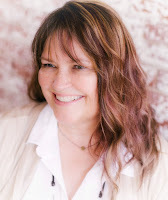 Edie Melson is a woman of faith with ink-stained fingers observing life through the lens of her camera. No matter whether she’s talking to writers, entrepreneurs, or readers, her first advice is always “Find your voice, live your story.” As an author, blogger, and speaker she’s encouraged and challenged audiences across the country and around the world. Her numerous books reflect her passion to help others develop the strength of their God-given gifts and apply them to their lives.Connect with her on her website, through Facebook, Twitter and on Instagram.
Edie Melson is a woman of faith with ink-stained fingers observing life through the lens of her camera. No matter whether she’s talking to writers, entrepreneurs, or readers, her first advice is always “Find your voice, live your story.” As an author, blogger, and speaker she’s encouraged and challenged audiences across the country and around the world. Her numerous books reflect her passion to help others develop the strength of their God-given gifts and apply them to their lives.Connect with her on her website, through Facebook, Twitter and on Instagram.Featured Image: Photo by Bookblock on Unsplash
August 27, 2023
Are Writers Left-Brained or Right-Brained and Does it really matter?

by Ane Mulligan @AneMulligan
Do you ever get a "bee in your bonnet" as my grandmother used to say? The other day, as I applied some suggestions from my wonderful critique partners, I realized I had concentrated so hard on getting the action down I forgot the emotion. That's not like me.
Or is it?
I decided to do a little research on how I write and why. Boy, did my eyes get opened!
"Almost every action connected with language—both spoken and written—is a function of the brain's left side."
WHAT?? No way! I'm a right-brained creative.
I looked at the screen again. It went on to say, "For example, writing is a typical left-brain trait for both left- and right-handed people."
I don't know where the handedness comes in, but I had to delve deeper.
From The Plot Whisperer, by Martha Alderson:
"The left-brained writer thinks in language more often than images and is quite comfortable with action. He might also be analytical and detail oriented. If you crave action and 'spew out dialogue at will' you are a left-brained writer."
I can spew out dialogue, but I'm a playwright, too. I see scenes play out in my mind. I'm detail oriented but absolutely haven't a single analytical bone in my body. It's why I don't write mysteries.
"The right-brained writer thinks in pictures rather than language and likely starts his writing developing characters or emotional moments in the story. (Me, me me!!) He takes a more intuitive approach. If you fall in love with your characters and love to ponder theme and meaning, you are more right-brain oriented."
Wait … what?
When I read that part about "ponder theme and meaning," she kind of lost me. That's when I realized though I'm definitely right-brained, my left-brain is almost as well developed. I know my inner editor dwells there and I cannot shut her up.
So what does knowing this do for me?
I used to outline a story, but the more I write, the more I realize for me, it's all about the character. I spend a lot of time getting to know my characters. When I begin writing, the character takes the story where she will. So the more my storytelling muscle develops, the more seat-of-the-pants I become. My right-brain (R-B) loves that.
If I get stuck, my L-B cheers and takes over, shoving R-B into the closet and noodling ideas to get us back on track. As ideas pop up, I record them, so I don't forget. Some I use and some get left on the old drawing board. But as much as L-B wants to outline, R-B refuses and quickly retakes possession of the story.
While writers use both sides, it helps to know which side is dominant.
For me, it's my R-B. Knowing that, I figured out where my strengths and weaknesses are. When I need my L-B for action and plot points, it shows up and helps me out.
But R-B won't let it play for long. It shoves L-B back into the closet without so much as a "thank you ma'am," to be brought out only if I get in trouble again.
The more I studied the way I write and how my brain works, I've decided my R-B is definitely dominant. But my L-B still fights for its place.
Which are you and how does it affect your writing? Join the conversation.
TWEETABLE
 Ane Mulligan lives life from a director’s chair, both in theatre and at her desk creating novels. Entranced with story by age three, at five she saw PETER PAN onstage and was struck with a fever from which she never recovered—stage fever. One day, her passions collided, and an award-winning, bestselling novelist emerged. She believes chocolate and coffee are two of the four major food groups and lives in Sugar Hill, GA, with her artist husband and a rascally Rottweiler. Find Ane on her website, Amazon Author page, Facebook, Instagram, Pinterest, The Write Conversation, and Blue Ridge Conference Blog
.
Ane Mulligan lives life from a director’s chair, both in theatre and at her desk creating novels. Entranced with story by age three, at five she saw PETER PAN onstage and was struck with a fever from which she never recovered—stage fever. One day, her passions collided, and an award-winning, bestselling novelist emerged. She believes chocolate and coffee are two of the four major food groups and lives in Sugar Hill, GA, with her artist husband and a rascally Rottweiler. Find Ane on her website, Amazon Author page, Facebook, Instagram, Pinterest, The Write Conversation, and Blue Ridge Conference Blog
.
Featured Image: Photo by Thought Catalog on Unsplash
August 26, 2023
For Writers: Finding True Balance for In the Busy Season Ahead
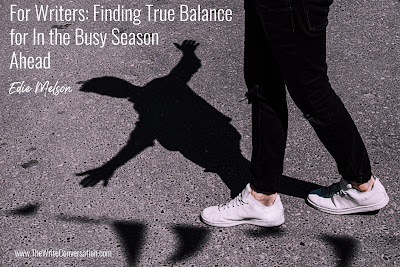
by Edie Melson @EdieMelson
So, trust the Lord always, because he is our Rock forever. Isaiah 26:4
Everywhere we turn we’re being urged to find balance. In advertising we’re given soothing images of candles, yoga, exercise, places to get away, etc. etc. etc. But I’ve recently begun to ask myself if that is really what living a balanced life is all about. And I’ve come to a startling revelation.
A balanced life doesn’t look like we think it should.
I’ve come to realize that balance isn’t an exterior thing, it’s an interior thing. I don’t care how strict we are about planning, diet, exercise, even environment, times of chaos will erupt. We know this is true by experience, but more importantly by looking at the life Jesus lived.
As we march through the New Testament, we see that he has times when the crowds are pushing in, clamoring for attention. We see times when his followers disappoint him. We even see times when he is faced with unexpected (in a human sense) death.
But we also see a perfect example of living a life of balance. And it has nothing to do with what’s going on around him, much less planning, diet, exercise or environment. It has everything to do with allowing God to direct his steps.
To paraphrase a popular song, sometimes He calms the storms and sometimes He calms His child.
So as I launch full-force into this busy fall season, I’m going to make some changes. I’m looking to God for balance, not at what’s happening around me. Care to join me?
TWEETABLEFor Writers: Finding True Balance for In the Busy Season Ahead from @EdieMelson (Click to Tweet)
 Edie Melson is a woman of faith with ink-stained fingers observing life through the lens of her camera. No matter whether she’s talking to writers, entrepreneurs, or readers, her first advice is always “Find your voice, live your story.” As an author, blogger, and speaker she’s encouraged and challenged audiences across the country and around the world. Her numerous books reflect her passion to help others develop the strength of their God-given gifts and apply them to their lives.Connect with her on her website, through Facebook, Twitter and on Instagram.
Edie Melson is a woman of faith with ink-stained fingers observing life through the lens of her camera. No matter whether she’s talking to writers, entrepreneurs, or readers, her first advice is always “Find your voice, live your story.” As an author, blogger, and speaker she’s encouraged and challenged audiences across the country and around the world. Her numerous books reflect her passion to help others develop the strength of their God-given gifts and apply them to their lives.Connect with her on her website, through Facebook, Twitter and on Instagram.Featured Image: Photo by Raphael Renter on Unsplash
August 25, 2023
How to Avoid Blowing a Critical Writing Career Opportunity
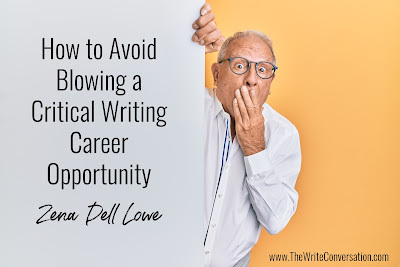
by Zena Dell Lowe @ZenaDellLowe
I recently had one of my former coaching clients reach out to ask for some advice. He’s a seasoned author who is new to the world of screenwriting, and he’d just finished his first ever screenplay. Well, the story concept generated immediate interest from a high-level industry exec, who asked to see the script right away. Opportunities like this don’t come along every day. So, naturally, my client was eager to send it off, but (wisely) asked for my advice first.
In case you ever find yourself in a similar situation, here are a few critical things to remember.
4 Steps to Make Wise Writing Decisions
1. There are no points awarded for speed. All that matters is that it’s good.
In the case of my former client, I could tell he was chomping at the bit for me to give my go ahead. Instead, I recommended he hold off. For one thing, he hadn’t received any feedback on the draft yet. No one besides himself had read his project. Now, it’s all very well and good for you to be confident in your writing. But the fact is, we’re all too close to the forest to see the trees. That’s why we need first readers.
So, the first thing I told him was that he needed to submit the finished script to his “first readers.” By that, I mean a small group of people, say, 3-5 people total, who will read your draft and give you detailed feedback. You need to know what works and what doesn’t, and what plot holes need to be fixed. And I guarantee, there will be things that need to be fixed! Now, maybe it won’t be a lot of things. The more you write, the better you get, and the fewer issues will be found after you complete your first draft. Even so, the point is that you need to make sure your project is really ready to be put in front of some exec, which means you must wait to get feedback from your first readers first.
2. Decision makers are willing to wait—provided the project is excellent.
We have this idea that if we don’t jump on an opportunity like this right away, that it will dry up and we’ll miss the chance, forever. But the truth is, anyone who expressed interest in the concept initially will still be interested a month or two or even four or six down the road. In fact, they’d much prefer to wait if it means the quality of the end product will be better.
As I already mentioned, there’s no advantage to submitting a script prematurely. Handing over a sub-par project will only blow a critical opportunity. And while I’m guessing you agree with me that this would indeed be the wise course of action, I can guarantee that when the critical opportunity happens to you, you’ll be torn over the decision.
3. Beware of FOMO (Fear of Missing Out).
It’s always tempting to send something ASAP whenever someone “high up” expresses interest in your work. This is especially true when that someone is from Hollywood, which carries that extra feeling of “magic.” Plus, the people in Hollywood always seem to give off the impression that they’re going places fast. They trigger that sense of urgency—“send it to me NOW—things are happening NOW—this is a ONCE IN A LIFETIME opportunity RIGHT NOW!” All you can think is that you must act NOW, and if you don’t, it’ll be too late.
This gut-wrenching, panic-inducing, anxiety-stimulating experience is called FOMO (the fear of missing out), and even the most psychologically savvy of us is susceptible. This is because it triggers the “lizard” brain, that part of the brain hard-wired to ensure our survival. As soon as those fear neurons start firing, it becomes very difficult for our rational minds to stay in control. And this is when we often make mistakes.
4. Train yourself to wait.
A key principle that will help protect you from FOMO is this:
Make it a habit to wait a few days before responding to ANY high-pressure or time-sensitive opportunity.
The minute you feel pressured or anxious or obligated to decide NOW, that’s when you force yourself to wait. Just wait. Give it three days. By then, your rational mind will have regained control and you can make a decision free from the bonds of fear.
Oh, and by the way, don’t hesitate to apply this same principle to your personal relationships. We can often feel cajoled or guilted into doing things by our family or friends that we don’t, in fact, want to do. Ever wonder how you ended up in that same situation yet again!? Dollars to donuts, you committed yourself prematurely, and therefore felt “stuck” on the follow through. This principle can be handy in ALL of your relationships, not just your professional ones.
TWEETABLEHow to Avoid Blowing a Critical Writing Career Opportunity from @ZenaDellLowe on @EdieMelson (Click to Tweet)
 Zena has worked professionally in the entertainment industry for over 20 years as a writer, producer, director, actress, and story consultant. Zena also teaches advanced classes on writing all over the country. As a writer, Zena has won numerous awards for her work. She also has several feature film projects in development through her independent production company, Mission Ranch Films. In addition to her work as a filmmaker, Zena launched The Storyteller’s Mission with Zena Dell Lowe, a podcast designed to serve the whole artist, not just focus on craft. In 2021, Zena launched The Storyteller’s Mission Online Platform, where she offers advanced classes and other key services to writers. Zena loves story and loves to support storytellers. Her passion is to equip artists of all levels to achieve excellence at their craft, so that they will truly have everything they need to change the world for the better through story.
Zena has worked professionally in the entertainment industry for over 20 years as a writer, producer, director, actress, and story consultant. Zena also teaches advanced classes on writing all over the country. As a writer, Zena has won numerous awards for her work. She also has several feature film projects in development through her independent production company, Mission Ranch Films. In addition to her work as a filmmaker, Zena launched The Storyteller’s Mission with Zena Dell Lowe, a podcast designed to serve the whole artist, not just focus on craft. In 2021, Zena launched The Storyteller’s Mission Online Platform, where she offers advanced classes and other key services to writers. Zena loves story and loves to support storytellers. Her passion is to equip artists of all levels to achieve excellence at their craft, so that they will truly have everything they need to change the world for the better through story.To find out more about Zena or her current courses and projects, check out her websites at WWW.MISSIONRANCHFILMS.COM and WWW.THESTORYTELLERSMISSION.COM
Featured Image: Photo by krakenimages on Unsplash
August 24, 2023
8 Questions Every Speaker Needs to Ask Before Booking an Event
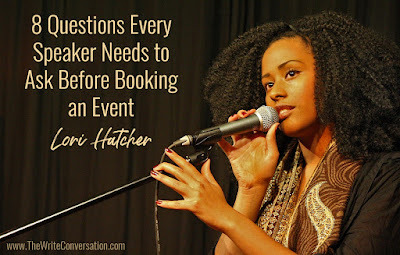
by Lori Hatcher @LoriHatcher2
Asking good questions and receiving good answers long before you step on stage can make or break your speaking presentation. As writers, we sometimes have the opportunity to share our message with in-person audiences—at book clubs, ministry events, civic gatherings, and other special occasions. As we prepare for an event, we pray, develop our presentation, and practice, practice, practice. Sadly, many writer/speakers fail to ask important questions during their event coordinator interview.
Picture the phone call:
“Hi, this is Mary from First Baptist Church. One of our members heard you speak recently and suggested we ask you to speak at our women’s ministry event.”
“Yes, I’d love to,” you say. You note the day and time, agree on the topic and your speaking fee, and say goodbye.
Seasoned speakers, however, know you should ask a few more question before you end the call.
Today, I’d like to share eight questions you’ll want to ask the event coordinator during this all-important conversation.
8 Questions Every Speaker Should Ask
1. What is your goal for this event? Inspiration? Teaching? Fun? Relationship building? You may get more than one answer, but clarifying the primary goal will help you craft the perfect message.
2. Who will attend? Women? Men? A mixed group? Cancer survivors? Young mothers? Knowing your audience helps you speak to their specific needs.
3. What’s the age range of attendees? As in writing, knowing the age range of your audience helps you choose appropriate illustrations and cultural references. You can talk about oleo and Dream Whip to a group of seniors and save the quinoa and almond flour references for the younger crowd. If you’re speaking to a mixed crowd, aim for universally understood examples.
4. How many attendees do you expect? This question helps you know how intimate the gathering is. The size of the audience (and, by default) the venue helps you prepare your intentional gestures, number of handouts, and tone. Picture sharing with your Sunday school class versus speaking at a national convention. The size of the audience also helps you set your speaking fee.
5. What is the dress code? Is the gathering flip flop casual, black tie, or somewhere in between? As the speaker, you should dress one level above what the average attendee is wearing. But only one level. Too formal at an informal event makes you appear out of touch or unapproachable. Too casual can imply carelessness or disrespect.
6. Will there be a meal, and will I speak before or after the meal? The time slot directly following a meal is one of the most challenging times to speak. People with a full tummy get sleepy, so if you drew this time slot, you’ll need to be extra engaging and creative. If your presentation is long, plan a group activity or a “stand and stretch” break midway through. If you speak immediately before a meal, be sure to end on time. You won’t get asked back if you make them late for lunch.
7. Is there anything going on within the group I should know about? One women’s ministry coordinator I spoke to shared that several church leaders were battling cancer. Another mentioned one of their beloved members had recently died of COVID. Yet another told me that a local mill had closed, causing widespread unemployment. These details enable you to tailor your presentation in light of these events and avoid saying something insensitive.
8. How may I pray for you? Speakers spend many hours preparing for an event, but it’s the ministry leader and their team who carry the lion’s share of the responsibility. For most, this isn’t their fulltime job. They serve in the midst of a busy life. Asking how you can pray for them helps lighten this burden. After you ask, be sure to close your conversation in prayer.
As you prepare to share your message, don’t skip the all-important event coordinator interview. Asking good questions will pave the way for a powerful and effective presentation.
TWEETABLE8 Questions Every Speaker Needs to Ask Before Booking an Event from @LoriHatcher2 on @EdieMelson (Click to Tweet)
 Lori Hatcher loves to inspire and equip others through the written and spoken word. A popular women’s ministry speaker and writing/speaking instructor, Lori is an Advanced Communicator God and Advanced Leader Bronze with Toastmasters International. She writes for Our Daily Bread, Guideposts, Revive Our Hearts, and Crosswalk.com. Check out her latest devotional, Refresh Your Hope, 60 Devotions for Trusting God with All Your Heart, from Our Daily Bread Publishing. Invite her to speak or teach at your event by contacting her at LoriHatcher.com or on FACEBOOK, TWITTER(@lorihatcher2) or PINTEREST(Hungry for God).
Lori Hatcher loves to inspire and equip others through the written and spoken word. A popular women’s ministry speaker and writing/speaking instructor, Lori is an Advanced Communicator God and Advanced Leader Bronze with Toastmasters International. She writes for Our Daily Bread, Guideposts, Revive Our Hearts, and Crosswalk.com. Check out her latest devotional, Refresh Your Hope, 60 Devotions for Trusting God with All Your Heart, from Our Daily Bread Publishing. Invite her to speak or teach at your event by contacting her at LoriHatcher.com or on FACEBOOK, TWITTER(@lorihatcher2) or PINTEREST(Hungry for God).
August 23, 2023
Give Your Writing Dream Roots that Will Stay Strong in the Storms to Come with These 10 Tips
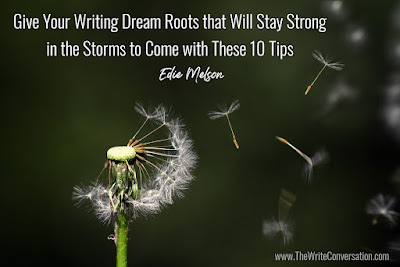
by Edie Melson @EdieMelson
Despite news to the contrary, I believe this is the best time ever to be a writer. Writing for a living isn’t a get rich quick scheme, but it is possible to make a reasonable income. Becoming a professional writer takes hard work. But if we’re willing to learn the industry and the craft of writing, we can find success. Today I’m going to share my tips that will help you find that success.
10 Foundational Tips to Strengthen Your Writing Dreams
1. We must realize that it’s a journey and not a destination. This industry is constantly changing. There’s new technology to keep up with, new trends, and even new grammar rules. We do get more experienced, but we never arrive at the point where we know everything.2. We need to be ready to make writing a priority. As I said, in the early stages of becoming a professional writer, we do a good bit of writing for free. Because we’re not getting paid, it’s tempting to think what we’re ding isn’t valuable. We let other requests and commitments get in the way.3. We must invest in learning. This means we commit to spending time reading books and blogs. We also need to invest in classes, workshops, and conferences.4. We shouldn’t expect to get paid for everything we write. I don’t recommend working only for free, but in the beginning, it’s the way we prove our ability and gain valuable experience. Think of it as unpaid internships. Here are two posts that help set reasonable guidelines:Why Professional Writers Should Write for Free, Part 1Why Professional Writers Should Write for Free, Part 25. We have to recognize that learning to write is just part of the equation. Just like any other profession, the publishing industry has a specific way of doing things. It’s important to learn how things are done and the standards that are expected from industry professionals.6. We must not neglect networking. Networking is vital in the publishing industry. We get to know editors and agents because they may one day buy and sell our works. We build relationships with other writers because we need the support and encouragement of those who know our struggles and our joys. Beyond that, other writers are a valuable resource for publishing leads.7. We cannot rely on talent to get us where we want to go. Talent CAN be a starting point, but it isn’t the most necessary component of a successful writer. Diligence, determination, humility, and a teachable heart are things that will get you where you want to go.8. We have to have the courage to try new things. To earn a viable income as a professional writer, we’ll have to step outside our comfort zone. We’ll need multiple income streams and be willing to change as the industry changes.9. Learning new technology is mandatory. Technology isn’t an enemy, it’s a tool. And it’s one that we must each learn to use.10. The path to success is different for each of us. Falling into the comparison trap can be fatal. Becoming a professional writer takes time and hard work, but there’s no magic formula.
These are the things that I believe can put you on the road to becoming a professional writer. Many of you out there also have some valuable insights. I’d love you to share your thoughts in the comments section below.
Don’t forget to join the conversation!Blessings, Edie
TWEETABLEGive Your Writing Dream Roots that Will Stay Strong in the Storms to Come with These 10 Tips from @EdieMelson (Click to Tweet)
 Edie Melson is a woman of faith with ink-stained fingers observing life through the lens of her camera. No matter whether she’s talking to writers, entrepreneurs, or readers, her first advice is always “Find your voice, live your story.” As an author, blogger, and speaker she’s encouraged and challenged audiences across the country and around the world. Her numerous books reflect her passion to help others develop the strength of their God-given gifts and apply them to their lives.Connect with her on her website, through Facebook, Twitter and on Instagram.
Edie Melson is a woman of faith with ink-stained fingers observing life through the lens of her camera. No matter whether she’s talking to writers, entrepreneurs, or readers, her first advice is always “Find your voice, live your story.” As an author, blogger, and speaker she’s encouraged and challenged audiences across the country and around the world. Her numerous books reflect her passion to help others develop the strength of their God-given gifts and apply them to their lives.Connect with her on her website, through Facebook, Twitter and on Instagram.
August 22, 2023
Learn the Art and Purpose of Subtext to Make the Books You Write and the Stories You Tell Better
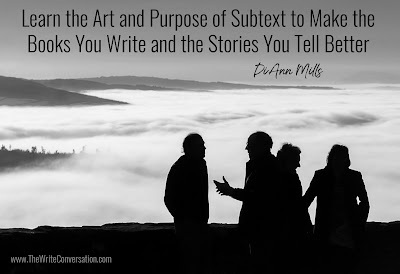
by DiAnn Mills @DiAnnMills
Subtext refers to characters who talk about one thing but really mean something else, and they both know it. And we’ve all done it, right? The subtext is the real conversation hidden by surface talk and is the core of the communication. The technique provides information that can be laced with sarcasm, heartbreak, or humor. And it always deepens the story with unpredictable outcomes and emotion.
Reading between the lines means a person has the ability of understanding others through intuition or a sixth sense. The difference with subtext is the characters engaged in the conversation know the hidden meaning; it’s an unspoken conversation below a verbal conversation and more valuable than the spoken word.
So why use subtext? Why not have the characters state the obvious instead of flirting with the real topic? Isn’t it a waste of time for the writer and the reader? Communication that fulfills only one purpose is like serving a meal with no salt. The result might satisfy the tummy, but the experience is tasteless. Dialogue written without layers eliminates the reader’s ability to experience the story.
At times, our characters use subtext to show discretion.They fear the wrong people understanding the real conversation could cost a huge price. They haven’t the courage to express what is on their hearts or minds.The underlying message is only for an elect few.The character has an ulterior motive.
The value of subtext in our writing:Provides information to the reader without telling.Adds stress, tension, and conflict to the scene.Reveals another layer of plot.Shows insight to the character.Pushes the plot forward.Offers mystery and intrigue.Lays groundwork for plot points and/or foreshadows a future event.Allows the reader to play a role in the dialogue’s meaning.Shows the reader that the writer respects their intelligence.Encourages the reader to pay attention
An example of subtext that affects matters of the heart:
Lucy tugged on her favorite red dress for her anniversary dinner. Twenty pounds ago, she looked like a siren, but her current bulges churned her stomach. Giving birth to three kids didn’t help. Grabbing her evening clutch, she joined Jake in the living room.
“Does this make me look fat?” she said.
“Of course not. You are as beautiful as the day we took our vows, thirty years ago.”
In the above, what does Lucy mean by her question? (Do you still love me although I’ve gained weight?)
What does Jake mean in his response? (I don’t care about your weight. I fell in love with your heart, and I love you more every day.)
Subtext is especially effective when characters have opposing desires and yet are forced to communicate with each other. Better yet, when they’re put into a situation where they must work together to achieve a common goal that’s crucial to each, for different reasons.
An example of subtext when the context of the real conversation could cost the character more than he/she is willing to pay:
The CEO called Melissa to the podium. She stopped at Tom’s chair in the boardroom and bent to his ear. “My proposal seals the deal with the company, and I know my raise and promotion is in the works,” she said. “Too bad, Tommy. I’ll be your boss.”
He bit back the sarcasm. The woman made him want to eat nails. “Good for you.”
Melissa continued to the head of the table, but the CEO stopped her. “Melissa, I have a quick announcement to make.”
She nodded and waited. Perfectly poised.
The CEO took the podium. “Melissa has developed an innovative program to streamline our inner office communications. She is ready to give the presentation, but I want to announce the other person who will be helping her drive this forward.” He paused. “Tom, come on up here. I’m thrilled you’ll be working right alongside Melissa. Your attention to detail is just what this project needs. We have three months to implement the new guidelines, and you two are the perfect team to make sure it’s completed effectively and efficiently. This project will be your 9 to 5 job.”
Tom approached the CEO and shook his hand. “Thank you, sir. You won’t be disappointed.”
Melissa gave Tom an icy smile. “Congratulations. The idea of working alongside you for the next three months is a bonus. I look forward to learning from you.”
Tom’s head pounded at the thought of what lay ahead. “Thank you for all you’ve done for the project. I look forward to combining our goals to make the new program successful.”
The CEO raised his hand. “A round of applause for this new team. I expect we will see great achievements from Tom and Melissa.” He gestured at the two. “If you finish the project before the three-month period, I’ll have a handsome bonus for each of you.”
The above scenario paints a road of emotional turmoil for Tom and Melissa. They must work together for the good of the project and the company. Plus, a bonus for completing the job early sounds amazing. Yet . . . how will they deal with their differences in an environment that expects and demands they remain civil to each other?
An example of subtext in the case of danger:
The masked kidnapper held out his cell phone to me. “One word that tips off your dad to our location, and you’re dead. Proof of life and the type of bills are all he needs to pay us.”
I had no reason to doubt the man. “Hello, this is Lisa.”
“Honey, are you okay?” Dad said.
“Yes. They want their money in small denominations. Ah, twenties.”
“Okay. I’ll wait to see when and where. I love you.”
I hoped Dad knew I was being held at Jackson Park on the wooded side behind our church.
“When we humans speak, we are not merely communicating information but attempting to make an impression and achieve a goal. And sometimes we are hoping to prevent the listener from noticing what we are NOT saying, which is often not merely distracting but, we fear, as audible as what we ARE saying. As a result, dialogue usually contains as much or even more subtext than it does text. More is going on under the surface than on it. One mark of badly written dialogue is that it is only doing one thing, at most, at once.” Francine Prose
Subtext is more than a dialogue technique. It’s amazing fun for the writer, a behind the scenes game between the characters and the writer.
*Excerpt from Exploring the Art of Emotion and Dialogue by DiAnn Mills, shared with permission from Bold Vision Books, Inc .
TWEETABLELearn the Art and Purpose of Subtext to Make the Books You Write and the Stories You Tell Better - @DiAnnMills on @EdieMelson (Click to Tweet)
 DiAnn Mills is a bestselling author who believes her readers should expect an adventure. She creates action-packed, suspense-filled novels to thrill readers. Her titles have appeared on the CBA and ECPA bestseller lists; won two Christy Awards; and been finalists for the RITA, Daphne Du Maurier, Inspirational Readers’ Choice, and Carol award contests.
DiAnn Mills is a bestselling author who believes her readers should expect an adventure. She creates action-packed, suspense-filled novels to thrill readers. Her titles have appeared on the CBA and ECPA bestseller lists; won two Christy Awards; and been finalists for the RITA, Daphne Du Maurier, Inspirational Readers’ Choice, and Carol award contests. She is the former director of the Blue Ridge Mountain Christian Writers Conference, Mountainside Marketing Retreat, and Mountainside Novelist Retreat with social media specialist Edie Melson. Connect here: DiAnnMills.com
August 21, 2023
Dipping the Quill Deeper: The Senior Guard
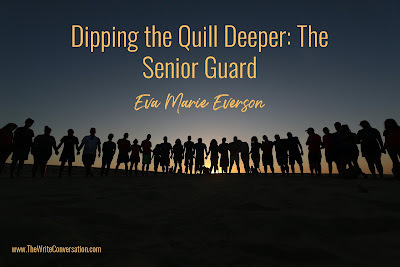
by Eva Marie Everson @EversonAuthor
The Bible is filled with verses that instruct the older generation to teach and lead the younger.
My son, do not forget my teaching … (Proverbs 3:1)
[Older women] are to teach what is good, and so train the young women … (Titus 2:3c)
I remember being younger, wondering if I’d ever be considered old enough to even remotely be considered wise enough . . . or knowledgeable enough … or intelligent enough. Would my “words of wisdom” ever be sought after? Considered worthy?
Not too long ago I left my role as vice president of my HOA. When I put in my resignation, my fellow board members said, “But you’re our voice of reason” as their cry for wanting me to stay.
Yay, I thought, I’m finally old enough to be the voice of reason.
Back in My Day
I came into the world of Christian publishing in 1997, the year I turned 40, the year I thought I had finally come into full adulthood.
Mmmhmm.
Now, at 66, I’m the “voice of reason.”
And, I admit, I am (at times). I’m calmer about most things. I see things from different perspectives. I don’t jump to as many conclusions and I tend to act rather than react.
When I entered Christian publishing, I was 26 years younger and several pounds lighter. “Tiny,” is how one of my more seasoned colleagues described me. (It’s true what they say about spending too much time sitting in front of a computer or laptop.) I came in green as Ireland’s grass and nearly clueless. I met “older” men and women, those who had paved the road and plowed the field for those like me. (I put quotes around older because a few were around my age, but most were, literally, older.)
I listened to what they had to say. I watched the way they worked, their methods of success, both in their work life and in their spiritual life.
While I have grown older and fluffier, a few of them have since retired or gone on to be with the Lord. But I’m also wiser—that “voice of reason.”
And Then Came Late May 2023
I arrived at the Blue Ridge Mountains Christian Writers Conference in late May of this year. This conference is one of my favorite events of the year (I lead the spiritual track and direct the contests, including the industry-wide Selah Awards). I’ve been a part of the conference since 2003, having only missed one year (even though I was invited) due to my brother’s terminal illness.
There was a moment—one I cannot quite tell you the exact second of—when I realized that I, at 66 and with 23 years of experience in Christian publishing, had slipped into the role of a senior guard. This came as I noted the number of young faces or the array of new faces—the junior guard.
Wisdom and reason felt as though it had given way to age and, let me be honest, worthlessness. Am I even relevant, I wondered. Even with my position, with my accomplishments, with my awards … do I have anything left to offer?
But then I remembered the senior guard from 23 years ago, those icons of faith and business who helped shape me. What an honor, I realized, to be that person to the junior guard.
Teach, lead, direct, be an example … these are the commands and instructions of God (or a general paraphrase). But this is a directive that comes with a warning.
Not many of you should become teachers, my fellow believers, because you know that we who teach will be judged more strictly (James 3:1).
Oh. Yay.
Home Again, Home Again
Sadly, after BRMCWC (or any conference I attend), the fun and fellowship came to an end. Like everyone else, I returned home. That first morning, I sat bleary-eyed with my cup of coffee and, in the silences, laid everything out before God. All my memories of the past senior guard. All my thoughts. My concerns. My confused feelings.
But mostly my desire to be my best in the senior guard position. Beautifully, He granted me the grace to see things from His perspective. This is the order of things, and you are a part of My order.
Okay, Lord, but can I keep up? Can I keep running this race?
Where You Are
You may be new to the world of Christian publishing (junior guard) or you may have loads of experience under your belt (senior guard). No matter—you have a place in God’s order of things. Every one of us is important in this ministry and in this business. And it is both.
My encouragement is this: enjoy your current position, whatever it is. Grow there. Thrive there. Be or become the voice of wisdom and reasoning by listening and learning, no matter the guard you are currently a part of. You’ll know when it’s time to pass the baton, but as long as you can, run.
And run well.
TWEETABLEDipping the Quill Deeper: The Senior Guard from author @EvaMarieEverson on @EdieMelson (Click to Tweet)
 Eva Marie Everson is the CEO of Word Weavers International, the director of Florida Christian Writers Conference, and the contest director for Blue Ridge Mountains Christian Writers Conference. She is the multiple award-winning author of more than 40 books and countless articles and blogposts. She is also an award-winning speaker and a Bible teacher and the most recent recipient of the AWSA Lifetime Achievement Award (2022).
Eva Marie Everson is the CEO of Word Weavers International, the director of Florida Christian Writers Conference, and the contest director for Blue Ridge Mountains Christian Writers Conference. She is the multiple award-winning author of more than 40 books and countless articles and blogposts. She is also an award-winning speaker and a Bible teacher and the most recent recipient of the AWSA Lifetime Achievement Award (2022). Eva Marie is often seen at writers conferences across the States. She served as a mentor for the Jerry B. Jenkins Christian Writers Guild and taught as a guest professor at Taylor University in 2011. She and her husband make their home in Central Florida where they enjoy their grandchildren. They are owned by one persnickety cat named Vanessa.
Eva Marie's latest book, THE THIRD PATH, takes a look at 26 of the questions God asked in the Bible, then makes them personal to the reader. The premise of the book is currently her most asked for continuing workshop at writers conferences.



